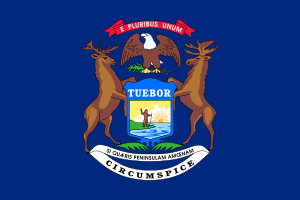Earl C. Michener
Earl Cory Michener (November 30, 1876 – July 4, 1957) was a politician from the U.S. state of Michigan.
Earl Cory Michener | |
|---|---|
.jpg) From Pictorial Directory of the 81st Congress (1949) | |
| Member of the U.S. House of Representatives from Michigan's 2nd district | |
| In office March 4, 1919 – March 3, 1933 | |
| Preceded by | Samuel W. Beakes |
| Succeeded by | John C. Lehr |
| Member of the U.S. House of Representatives from Michigan's 2nd district | |
| In office January 3, 1935 – January 3, 1951 | |
| Preceded by | John C. Lehr |
| Succeeded by | George Meader |
| Personal details | |
| Born | November 30, 1876 Attica, Ohio, U.S. |
| Died | July 4, 1957 (aged 80) Adrian, Michigan, U.S. |
| Resting place | Oakwood Cemetery Adrian, Michigan |
| Political party | Republican |
| Alma mater | University of Michigan George Washington University |
| Profession | Lawyer |
Michener had German ancestry.[1] He was born near Attica in Seneca County, Ohio. He moved with his parents to Adrian, Michigan in 1889 and attended the public schools there. During the Spanish–American War, he served in the U.S. Army as a private in Company B, Thirty-first Regiment, Michigan Volunteer Infantry, from April 26, 1898 to May 17, 1899. He studied law at the University of Michigan at Ann Arbor in 1901 and 1902, and graduated from the law department of Columbian University (now George Washington University), Washington, D.C., in 1903 where he was a member of Phi Sigma Kappa fraternity. He was admitted to the bar the same year and commenced practice in Adrian. He served as assistant prosecuting attorney for Lenawee County from 1907 to 1910 and prosecuting attorney from 1911 to 1914.
In 1918, Michener defeated incumbent Democrat Samuel W. Beakes to be elected as a Republican from Michigan's 2nd congressional district to the 69th United States Congress. He was subsequently re-elected to the following six Congresses, serving from March 4, 1919 to March 3, 1933. In 1926, he was one of the managers appointed by the House of Representatives to conduct the impeachment proceedings against George W. English, judge of the United States District Court for the Eastern District of Illinois.
Michener was an unsuccessful candidate for reelection in 1932, losing to Democrat John C. Lehr. Two years later he defeated Lehr, to be elected to 74th Congress and was subsequently re-elected to the seven succeeding Congresses, serving from January 3, 1935 to January 3, 1951. He served as chairman of the Committee on the Judiciary in the 80th Congress, and introduced the resolution that ultimately became the Twenty-second Amendment.[2] He was not a candidate for re-election in 1950.
Earl C. Michener maintained law offices in Adrian, until his death there. He was interred in Oakwood Cemetery.
References
- Kestenbaum, Lawrence. "German ancestry Politicians in Michigan". The Political Graveyard. Retrieved 26 August 2015.
- Neale, Thomas H. (October 19, 2009). "Presidential Terms and Tenure: Perspectives and Proposals for Change" (PDF). Washington, D.C.: Congressional Research Service, The Library of Congress. Retrieved March 28, 2018.
- United States Congress. "Earl C. Michener (id: M000693)". Biographical Directory of the United States Congress. Retrieved on 2008-02-10
- The Political Graveyard
| U.S. House of Representatives | ||
|---|---|---|
| Preceded by Samuel Beakes |
United States Representative for the 2nd Congressional District of Michigan 1919–1933 |
Succeeded by John C. Lehr |
| Preceded by John C. Lehr |
United States Representative for the 2nd Congressional District of Michigan 1935–1951 |
Succeeded by George Meader |

